Products
The 235-card set, titled Dead Man's Chest, features both starter sets and booster packs. The two-player starter set includes 62 cards (60 random normal cards and 2 Chamber cards), a rule book, a pair of playmats, and a plastic carrying case. The cards are split up into two 30 card decks so that two people can play, but can be combined to form one sixty card deck. However, because the cards are random, it is almost certain that such a deck would not be "tournament legal," as described in the rulebook's deck-building rules.
Booster packs contain 10 cards, typically distributed as 5 commons, 3 uncommons, 1 rare, and 1 Chamber card. Special foil "gold doubloon" cards appear in some boosters.
All Dead Man's Chest cards can be identified by the code PDC (Pirates Dead Man's Chest), which appears immediately before the number on each card.
In collectible card games, digital collectible card games and collectible miniature wargames, a booster pack is a sealed package of cards or figurines, designed to add to a player's collection. A set of pre-packaged booster packs is referred to as a booster box.

The Lord of the Rings Trading Card Game is an out-of-print collectible card game produced by Decipher, Inc. Released November 2001, it is based on Peter Jackson's The Lord of the Rings film trilogy and the J. R. R. Tolkien novel on which the films were based. Decipher also had the rights to The Hobbit novel but did not release any cards based on it. In addition to images taken from the films, in 2004 Weta Workshop produced artwork depicting characters and items from the novel absent from the films for use on cards. In 2002, LOTR TCG won the Origins Awards for Best Trading Card Game of 2001 and Best Graphic Presentation of a Card Game 2001. Decipher's license to The Lord of the Rings expired on July 30, 2007, after which all official promotion and distribution of the game had stopped.
A Game of Thrones: The Card Game is an out-of-print collectible card game produced by Fantasy Flight Games. It is based on A Song of Ice and Fire, a series of novels written by George R. R. Martin. The first set was Westeros Edition and was released in August 2002. It has since won two Origins Awards. The game's primary designer is Eric Lang, the lead developer is Nate French, with Damon Stone serving as associate designer.

The Yu-Gi-Oh! Trading Card Game is a Japanese collectible card game developed and published by Konami. It is based on the fictional game of Duel Monsters created by manga artist Kazuki Takahashi, which appears in portions of the manga franchise Yu-Gi-Oh!, and is the central plot device throughout its various anime adaptations and spinoff series.
Vampire: The Eternal Struggle is a multiplayer collectible card game published by White Wolf Publishing. It is set in the World of Darkness and is based on the Vampire: The Masquerade roleplaying game.

Shadowfist was created by Robin Laws and Jose Garcia. It was released in June 1995 as a collectible card game (CCG), but was shifted to a fixed distribution of cards as of 2013. It shares the same background as the Feng Shui role-playing game, also by Laws and Garcia and released the following year. In September 2018 ownership of Shadowfist switched to Vetusta Games.
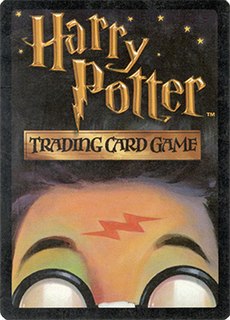
The Harry Potter Trading Card Game is an out-of-print collectible card game based in the world of J. K. Rowling's Harry Potter novels. Created by Wizards of the Coast in August 2001, the game was designed to compete with the Yu-Gi-Oh!, Pokémon and Magic: The Gathering card games. Its release was timed to coincide with the theatrical premiere of the first film in the series. The game was praised for the way it immersed children in the Harry Potter universe. At one point the game was the second best selling toy in the United States; however, it is now out of print.

Dragon Ball Z Trading Card Game is an out-of-print trading card game based on the Dragon Ball series created by Akira Toriyama. The game was produced by Score Entertainment and uses screen captures of the anime to attempt to recreate the famous events and battles seen in the anime. Score then sold the rights to Panini which eventually ceased publishing.
Raw Deal is an out-of-print collectible card game published by Comic Images and licensed from World Wrestling Entertainment. It was released in August 2000. It was designed to replicate the action of a professional wrestling match. The game was designed by Michael Foley and Barron Vangor Toth. On November 14, 2007, Comic Images released a press release stating that they had lost the WWE License due to declining sales. The game ceased production in December 2007. As of 2008, many of the players banded together to continue the game in what is now called the Virtual era. To date, 10 Virtual sets have been released, adding over 2,000 new cards to the game.

The World of Warcraft Trading Card Game is an out-of-print collectible card game based on Blizzard Entertainment's MMORPG, World of Warcraft. The game was announced by Upper Deck Entertainment on August 18, 2005 and released on October 25, 2006. Players can fight against each other one-on-one, or can join others in order to defeat dungeon/raid bosses based on those in the MMORPG. In March 2010, Upper Deck lost the license from Blizzard Entertainment. The license was acquired by Cryptozoic Entertainment later in the month, with the company announcing that planned card sets would be released.
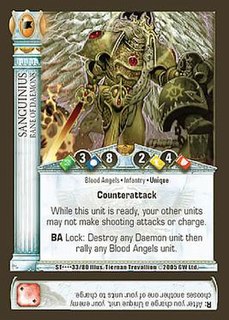
Horus Heresy is an out-of-print collectible card game originally produced in 2003 by Sabertooth Games. The game is set in the Warhammer 40,000 fictional universe developed by parent company Games Workshop. It attempts to recreate the struggle between the Loyalist forces of the Emperor of Mankind and the Traitor forces of Warmaster Horus, during the civil war known as the Horus Heresy. The game's development and sale by the publisher were discontinued in 2008, following financial difficulties at the parent company.

Avatar: The Last Airbender Trading Card Game is an out-of-print collectible card game based on the Nickelodeon animated television series Avatar: The Last Airbender. Upper Deck Entertainment launched this title in the first quarter of 2006.

The Dragon Booster Trading Card Game is an out-of-print collectible trading card game based on the animated television series Dragon Booster. The initial card set, Release the Dragon, was released in February 2005 by Score Entertainment.
QuickStrike is an out-of-print collectible card game gaming system developed by Upper Deck for use in their games. This system made its initial debut in 2006.
On The Edge was a collectible card game released in 1994, not long after Magic: The Gathering. The setting and characters were based on the RPG titled Over the Edge. The game's story was set on an island in the southern Mediterranean called Al Amarja, where various factions were fighting for control.
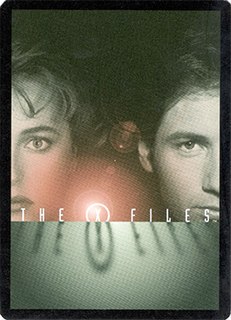
The X-Files Collectible Card Game is an out-of-print collectible card game based on The X-Files fictional universe. It was developed by NXT Games and published by the US Playing Card Company (USPCC).

The Bleach Trading Card Game is an out-of-print collectible card game from Score Entertainment, and is based on the manga and anime series of the same name.

Battlestar Galactica Collectible Card Game is an out-of-print collectible card game based on the Battlestar Galactica science fiction media franchise. The game, published by WizKids, saw first release in May 2006 and was officially canceled in March 2007.
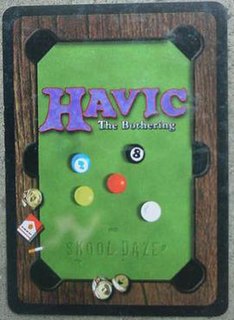
Havic: The Bothering is a parody of the collectible card game Magic: The Gathering. Havic was created by Peter Gray and Frank Martell and introduced in 1998 by PGI Limited.
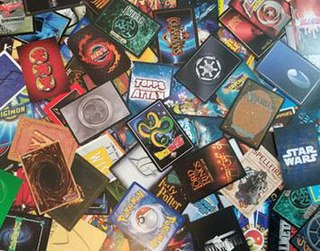
A collectible card game (CCG), also called a trading card game (TCG) among other names, is a type of card game that mixes strategic deck building elements with features of trading cards, introduced with Magic: The Gathering in 1993.













